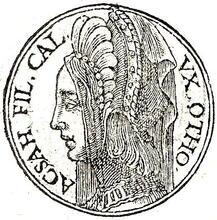Shunammite: Bible
The great woman of Shunem, although unnamed and rarely spoken to directly by Elisha, is shown as the head of her household and the unintimidated initiator in her relationship with the ninth-century B.C.E. prophet Elisha. She frequently asserts her decision-making power, refusing Elisha’s help early in their relationship, resisting his announcement that she will bear a son, and negotiating for the return of her land with the king.
Article
The “great woman of Shunem” appears twice in the narratives about the ninth century B.C.E. prophet Elisha. Her title suggests wealth, but also, as the story unfolds, independence of mind and faith. She recognizes Elisha as a man of God, offering him meals and building and furnishing a roof-chamber for his convenience (a decision announced to her husband, not submitted for his approval!). In response, the prophet offers her a boon, proposing to use his influence with the king or army commander. Although this offer foreshadows later events, here she proudly refuses such help, expressing confidence in her own people. Following up on his servant Gehazi’s observation of the woman’s childlessness, Elisha then announces she will bear a son. Again (and surprisingly, given the conventions of such announcement stories) she resists: “No, my lord, O man of God; do not deceive your servant” (2 Kgs 4:16). The child is born and grows into a youth.
One day, while helping his father in the fields, he falls sick. He is sent to his mother, the parent charged with health care and, in this case, with deciding what to do when the child dies. Brushing off her husband’s questions about her actions, the woman orders him to fetch her a servant and a donkey so that she might ride to Elisha at Mount Carmel. Notably unaware of what troubles her, Elisha sends Gehazi to question her. The woman, however, refuses to deal with an intermediary: she neither responds to Gehazi’s queries nor accepts Elisha’s wish to send his servant in his place. He accedes to her demand, returns with her, and restores the child to life.
The Shunammite woman appears again in 2 Kgs 8:1–6. Having accepted Elisha’s suggestion that she move her household away from Israel during a seven-year famine, she returns to appeal to the king for return of her house and her land. It so happens that she and her son appear at court just at the moment that Gehazi is regaling the king with the story of Elisha’s resurrection of the boy. Apparently impressed with this sight of a miracle in the flesh, the king restores the woman’s possessions.
Prophet legends such as these (compare 1 Kgs 17:8–24; 2 Kgs 4:1–7) usually serve to impress the reader or listener with the prophet’s power. The characterization of the great woman of Shunem both supports and subverts this purpose. In some respects, she is stereotypically subordinated to Elisha: he is named, whereas she is not; he rarely speaks directly to her, even when she is present; he decides that she should have a child, when she has expressed no such desire; she speechlessly bows in the face of his resurrecting power. On the other hand, she is presented as the decision-making head of her household and as the initiating and unintimidated actor in her relationship with the prophet—indeed, one who reveals the limits of Elisha’s own communication with God.
Camp, Claudia V. “1 and 2 Kings.” Women’s Bible Commentary, edited by Carol A. Newsom, Sharon H. Ringe, and Jacqueline E. Lapsley, 96–109. Louisville: Westminster, 2012.
Exum, Cheryl. “Song of Songs.” Women’s Bible Commentary, edited by Carol A. Newsom, Sharon H. Ringe, and Jacqueline E. Lapsley, 2247-54. Louisville: Westminster, 2012.
Long, Burke. “The Shunammite Woman: In the Shadow of the Prophet?” Bible Review 7 (1991): 12–19, 42.
Meyers, Carol. “The Shunammite Woman and the “Patriarchy Problem.” TheTorah.com. Posted 25 October 2018: https://thetorah.com/the-shunammite-woman-and-the-patriarchy-problem/
Shields, Mary E. “Subverting a Man of God, Elevating a Woman: Role and Power Reversals in 2 Kings 4.” Journal for the Study of the Old Testament 58 (1993): 59–69.
van Dijk-Hemmes, Fokkelien. “The Great Woman of Shunem and the Man of God: A Dual Interpretation of 2 Kings 4:8–37.” In A Feminist Companion to Samuel and Kings, edited by Athalya Brenner, 218–230. Sheffield, England: 1989.









